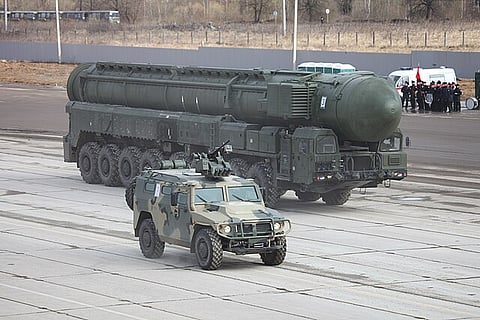

In a move to ease tensions between the world's two nuclear superpowers, Russia has offered to discuss allegations from Washington that it has carried out secret underground nuclear tests. Russian Foreign Minister Sergey Lavrov stated that Moscow is ready to engage with the U.S. on these suspicions, firmly rejecting the accusations as baseless.
The offer for dialogue comes after U.S. President Donald Trump claimed last month that Russia and China have been conducting secret nuclear tests, leading him to order the U.S. to resume its own testing "on an equal basis". These accusations have been firmly denied by both Moscow and Beijing. Kremlin spokesperson Dmitry Peskov noted that Russia has not received any clarification from Washington regarding the specifics of these allegations, stating, "So far, no explanations have been provided by our American counterparts".
Russian officials have consistently affirmed that they will not be the first to resume nuclear testing. However, they have made it clear that they will respond in kind if the United States does so. Foreign Minister Lavrov cited President Vladimir Putin's previous statements on the matter, noting, "He stated that if any of the nuclear powers conducts an actual nuclear weapons test... then Russia will respond in kind". This position was reiterated by Peskov, who emphasized that Russia adheres to its moratorium but would be forced to act "to observe parity" if another country breaks the commitment.
Lavrov also criticized a statement by a Pentagon nominee, Robert Kadlec, who suggested developing "nuclear response options" for regional conflicts. Lavrov described this as a "remarkable statement" that directly indicates an intention to view nuclear weapons as a tool for achieving U.S. objectives.
Russia has provided a technical rebuttal to the U.S. claims, distinguishing between different types of tests. Lavrov pointed out that while Russia has recently tested new nuclear-capable delivery systems, such as the "Burevestnik" cruise missile and "Poseidon" underwater drone, these are weapons system trials and not prohibited nuclear detonations. He clarified, "Other tests, both subcritical, or those without a chain nuclear reaction, and carrier tests, have never been prohibited".
In a confident rebuttal, Lavrov suggested that the United States could easily verify whether Russia had tested a nuclear warhead through the global seismic monitoring system, implying that the lack of such evidence proves the accusations are false.
Despite the heightened rhetoric on nuclear testing, Russia has signaled its willingness to keep diplomatic channels open. Lavrov offered to hold a face-to-face meeting with U.S. Secretary of State Marco Rubio, noting that their previous phone conversation was conducted politely and "without any breakdown". He also confirmed that Moscow is still open to a possible meeting between Presidents Putin and Trump.
Furthermore, Russia has expressed its commitment to nuclear arms control by proposing a one-year extension of the New START Treaty restrictions, which are set to expire in February 2026. Lavrov presented this as a "unilateral expression of goodwill" from Russia to maintain stability and "cool down" the current tensions.